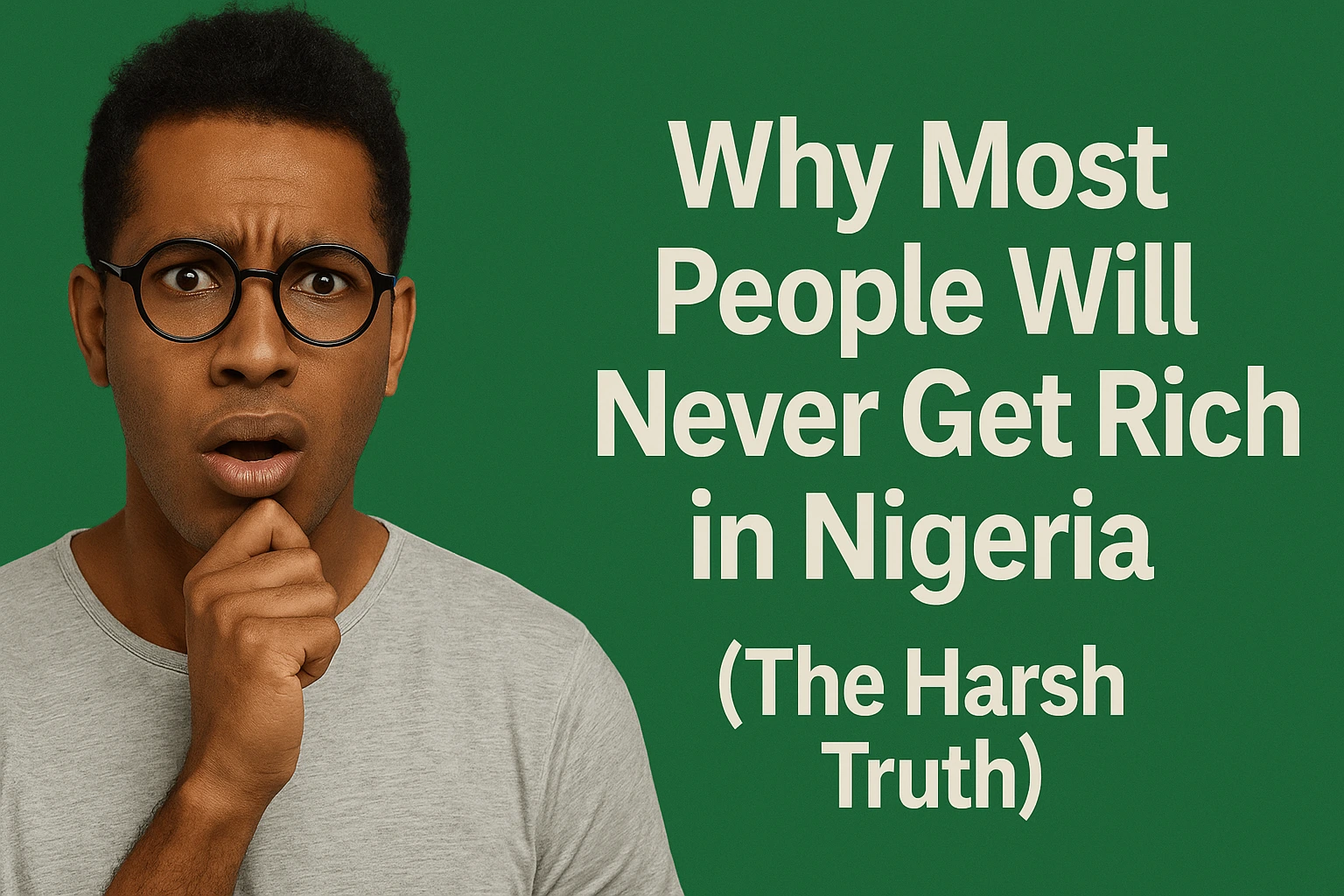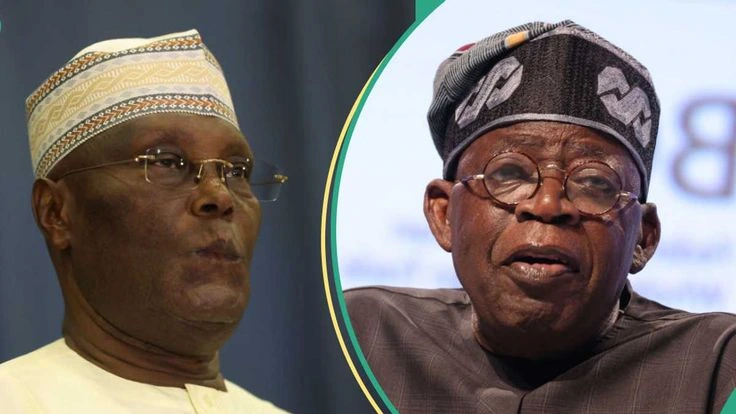Why Most People Will Never Get Rich in Nigeria (The Harsh Truth)
In a country where hustle is a lifestyle, and “soft life” is the dream, it’s hard to admit that most people in Nigeria will never get rich. Not because they don’t want to, or because they’re lazy. But because the system is wired against them, and worse, many are unknowingly wired against themselves.
If you’ve ever wondered why despite all your hard work, you’re still broke, this article will open your eyes. It’s not just about bad governance. It’s about mindset, money habits, and harsh realities we pretend not to see.
Welcome to the truth. It’s ugly, but it might just save your financial future.
1. The Salary Trap: You Can’t Save Your Way to Wealth
Let’s be honest: most people in Nigeria are surviving on salaries that can’t sustain a dignified life, let alone build wealth. Earning ₦150,000 a month may sound decent — until you subtract rent, transport, food, black tax, and unpredictable bills like hospital runs or fuel scarcity hikes.
The truth is, you cannot save your way to wealth in this country. With inflation eroding the value of the naira daily, what you save today is worth less tomorrow. And yet, most Nigerians remain stuck in the mindset that a “good job” will someday make them rich.
It won’t.
The salary system in Nigeria is designed for survival, not wealth. If your only income stream is your job, you’re one pink slip or emergency away from poverty. Wealthy people build multiple income streams, invest, and make money while they sleep. Poor people work hard for money — and rest when they’re broke.
2. Lack of Financial Literacy
Nigeria doesn’t teach people how to make, grow, or manage money. Not in schools. Not in most homes. So many people grow up believing that the only path to success is getting a good job and praying for a promotion.
There’s little to no understanding of compound interest, investment portfolios, digital assets, or even how debt works. People borrow to flex. They save in bank accounts that yield less than inflation. And they call anyone investing in stocks or crypto a gambler.
If you don’t understand money, money will never stay with you. Rich people are not always smarter — they’re just more financially educated. They know the difference between assets and liabilities. They make strategic decisions. And most importantly, they think long-term.
3. Cost of Living vs. Earning Potential
Every year, your salary stays the same — but your landlord doesn’t. Transport fares keep increasing. Food prices rise like prayers on Sunday morning. Yet most people’s incomes remain stagnant.
In this environment, the gap between what you earn and what you spend widens dangerously. The average Nigerian spends more than they earn, not because they’re wasteful, but because everything is expensive.
You cannot thrive in Nigeria today with only one source of income. Side hustles are no longer optional — they are survival tools. Whether it’s freelancing, reselling, tutoring, or tech, if you’re not making money in at least two ways, your finances will always be under pressure.
READ ALSO: No Degree, No Problem— 5 Online Jobs That Don’t Require a Degree
4. Cultural Pressure to Spend
Nigerians love to show up and show out. We have weddings like royalty, bury our dead like kings, and dress like millionaires — even when our bank accounts are dying.
This societal pressure to spend and impress is a poverty trap. People borrow for events, go broke to trend on Instagram, and buy things just to be seen as successful. It’s financial suicide disguised as enjoyment.
Add to this the unspoken “tax” of being Nigerian — you must support your extended family, give to relatives, donate to church, and be available for every emergency. If you don’t set boundaries, your money will never grow.

5. Inconsistent Policies and Corruption
Let’s not pretend governance doesn’t play a role. Nigeria is one of the hardest countries to run a business in — because the rules change without notice. Today you register a business. Tomorrow the government slaps a new levy on you. Or your goods get seized at the port. Or PHCN messes up your production for a week straight.
Corruption makes it worse. Bribes, double taxation, and unreliable infrastructure kill small businesses before they even start. And when the system is against growth, the people suffer.
No matter how brilliant or hardworking you are, if the environment is hostile, your hustle won’t go far.
6. Fear of Risk and the ‘Play It Safe’ Mentality
Many Nigerians are stuck in a survival mindset. They don’t want to take risks — because failure in Nigeria is expensive. There’s no backup system. No unemployment benefits. No real safety nets.
So people play it safe. They avoid investing. They avoid starting businesses. They reject unfamiliar opportunities — not because they’re lazy, but because they’re scared.
But wealth doesn’t come from playing safe. It comes from taking calculated risks. Every rich person you admire took risks that most people are afraid of. If you want wealth, you must learn to stomach discomfort — and invest in what you understand.
7. The Entitlement Mindset
A lot of people want to be rich, but they don’t want to do the work. They wait for the government to “empower” them. Or hope some rich uncle will dash them money. Or expect divine favor without effort.
This entitlement mindset is dangerous. It keeps people passive and bitter. It kills innovation. And it fosters laziness dressed up as spirituality.
No one owes you success. Not the government. Not your family. Not your village people. If you want wealth, you must create value. That’s the only proven path.
8. Poor Networking and Exposure
Who you know still matters. And in Nigeria, it can be the difference between being broke and being booked. But most people don’t know how to build networks. They stay in comfort zones, surrounded by people who are also struggling — and calling it loyalty.
Exposure changes everything. When you meet people who are doing better, thinking bigger, and building wealth, you start to believe it’s possible for you too. But if all your friends are broke, chances are you’ll stay broke too — because poverty is contagious.
Attend events. Join communities. Read books. Watch podcasts. Stretch your circle. Wealth flows in networks.
9. Copycat Hustles and Get-Rich-Quick Schemes
Everyone wants to blow, but no one wants to build. So we jump from one trend to another — dropshipping, forex, betting, MMM, pig butchery investment, you name it.
Instead of mastering a skill, most people copy what others are doing — not realizing that what worked for someone else may not work for you. Worse, we fall for Ponzi schemes and fake investment platforms because we’re desperate for fast results.
There’s no shortcut to sustainable wealth. If it sounds too good to be true, it probably is. The real money is in patience, consistency, and strategy — not vibes.
Conclusion: Nigeria Won’t Make You Rich — But You Can
Here’s the painful truth: Nigeria is hard. The system is broken. The odds are stacked against you. But you are not helpless.
Most people will never get rich in Nigeria — not because it’s impossible, but because they’re not willing to do what it takes. They won’t learn new skills. They won’t save aggressively. They won’t invest. They won’t delay gratification. They won’t shift their mindset.
But you can.
You can decide today to stop blaming and start building. Learn about money. Take calculated risks. Build multiple income streams. Surround yourself with growth-minded people.
Nigeria won’t hand you wealth on a platter. But if you’re intentional, disciplined, and strategic — you just might be the exception.
Next up: “Your 20s Are Almost Over — Here’s What You Should’ve Done Already”






